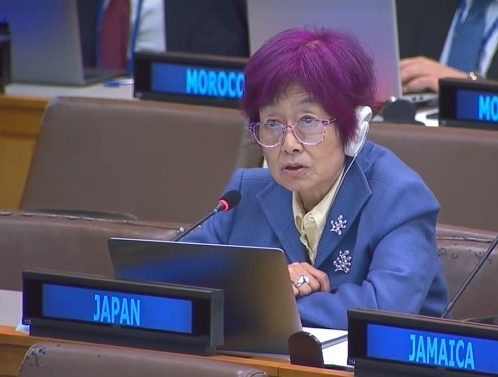Statement by Dr. KAMIYA Masako, Special Advisor to the Government of Japan, at the 79th Session of the Third Committee of the United Nations General Assembly, Item 26: Social Development
2024/10/4

Thank you, Madam Chair.
I would like to start by thanking your excellency, the bureau members, and the secretariat for organizing this session. I am attending this Committee as the Special Advisor to the Japanese delegation on the recommendations of women’s NGOs. It has been a long-standing tradition of Japan to have a representative from civil society for this Committee. I am honored to contribute to the important discussions that will be held in the coming weeks.
Madam Chair,
Today, people around the world, including the most vulnerable, are confronted by multiple, interlinked, and compounding crises, while the SDGs face mounting obstacles, with many goals falling off track. In response, Japan believes that a holistic approach focused on the “dignity” of each person is indispensable for overcoming these complex challenges and achieving the SDGs.
Madam Chair,
Climate change is an imminent and critical threat to all countries in various ways. Climate change-induced sea level rise threatens the very existence of SIDS, and conflicts can be triggered and exacerbated by mass flooding, droughts, desertification, and land degradation, among others. Japan is striving to overcome this urgent challenge by rigorous actions in both mitigation and adaptation, especially through decarbonization that is harmonized with economic growth and energy security. We are steadily taking actions and are on track to achieve net zero emissions by 2050.
Madam Chair,
At the UN General Assembly High-Level Meeting on universal health coverage (UHC) in September last year, the leaders endorsed a Political Declaration. This declaration highlighted the importance of issues such as promoting primary health care, tackling communicable and non-communicable diseases including mental health conditions, and improving access to health services, demonstrating strong political-level commitments in order to accelerate progress towards the achievement of UHC by 2030 and build a healthier world for all.
Japan, guided by human security and inclusivity, strongly believes in the transformative power of UHC and comprehensive healthcare. We will do our utmost to achieve UHC, contributing to a healthier and more equitable world for all.
Madam Chair,
From the perspective of “leaving no one behind” in social development, Japan attaches importance to the need to address the challenges faced by persons with disabilities.
In April this year, the Amended Act for Eliminating Discrimination against Persons with Disabilities entered into force. It fully obliges all businesses to provide reasonable accommodation for requests from persons with disabilities, which was previously an effort-based obligation.
Furthermore, Mr. TAMON Hiroshi, a Japanese lawyer with over 25 years of practical experience, will serve on the Committee on the Rights of Persons with Disabilities from 2025 to 2028. Japan reaffirms its commitment to the further implementation of the Convention on the Rights of Persons with Disabilities in pursuit of realizing a more inclusive society.
Madam Chair,
In 2025, the Second World Summit for Social Development will be held in Doha, Qatar, which can serve to accelerate action on the 2030 Agenda for Sustainable Development. Japan will actively participate in negotiations to adopt a concise, action-oriented outcome from the Summit. Japan adheres to the concept of human security and the key principle of the SDGs, “leaving no one behind,” and will do its utmost to promote international cooperation to empower those in vulnerable situations.
I thank you.
